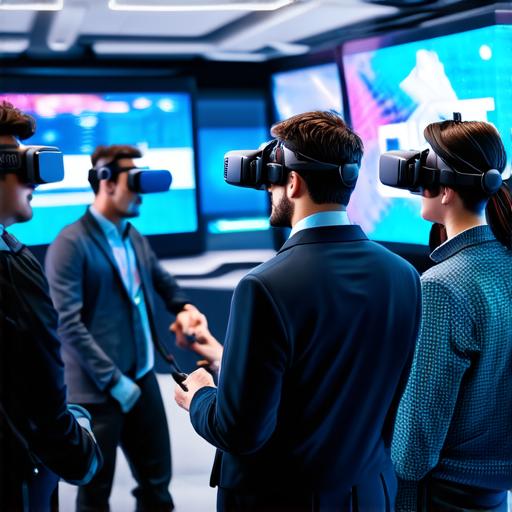
Where is it possible to engage with virtual reality?
Virtual reality (VR) is a rapidly growing technology that allows users to immerse themselves in artificial environments and interact with them in ways that were previously impossible. VR has the potential to revolutionize many industries, from gaming to healthcare, education, and more.
Gaming is one of the most obvious applications for virtual reality. VR games provide players with a level of immersion that traditional console or PC games simply cannot match. In addition to providing a more engaging experience, VR games can also offer unique gameplay mechanics that are only possible in a virtual environment.
Another area where virtual reality can be highly engaging is education. VR allows students to explore complex concepts and ideas in a way that is both immersive and interactive. For example, a biology class could use VR to take a virtual tour of the human body, allowing students to see how different systems work together in a 3D environment.
Healthcare is another industry that has begun to embrace virtual reality. VR can be used for a variety of purposes, including medical training, therapy, and rehabilitation.
Medical professionals can use VR simulations to practice surgical procedures or to learn about different medical conditions in a safe and controlled environment. Therapy sessions can also be conducted in VR, allowing patients to confront fears or traumas in a virtual environment.
Rehabilitation programs can use VR to help patients regain mobility and dexterity by simulating real-life scenarios in a virtual world.
Real estate is another industry that has begun to explore the potential of virtual reality. Virtual tours of properties allow buyers and renters to see inside homes, apartments, and commercial spaces without ever having to leave their own homes. This can save time and money, while also providing a more immersive and engaging experience than traditional real estate listings.

One of the main advantages of virtual reality is the level of immersion it provides. By wearing a VR headset and controllers, users can feel as if they are physically present in the virtual environment. This sense of presence can make gaming and educational experiences much more engaging, allowing users to fully immerse themselves in the experience.
Another benefit of virtual reality is its ability to offer unique gameplay mechanics that are only possible in a virtual environment. For example, a VR game might require players to physically duck and dodge behind objects to avoid enemy fire, or a puzzle game might involve physically moving pieces around a virtual board.
In healthcare, virtual reality can be used for medical training, therapy, and rehabilitation. Medical professionals can use VR simulations to practice surgical procedures or to learn about different medical conditions in a safe and controlled environment. Therapy sessions can also be conducted in VR, allowing patients to confront fears or traumas in a virtual environment.
Rehabilitation programs can use VR to help patients regain mobility and dexterity by simulating real-life scenarios in a virtual world.
Real estate is another industry that has begun to explore the potential of virtual reality. Virtual tours of properties allow buyers and renters to see inside homes, apartments, and commercial spaces without ever having to leave their own homes. This can save time and money, while also providing a more immersive and engaging experience than traditional real estate listings.
While there are many potential uses for virtual reality, there are also some challenges that need to be addressed. For example, virtual reality can be expensive, both in terms of hardware and software development. In addition, some people may experience motion sickness or other side effects when using VR headsets.
These issues will need to be addressed as virtual reality technology continues to advance.
In conclusion, virtual reality has the potential to revolutionize many industries, from gaming to healthcare, education, real estate, and more. As technology continues to improve and costs continue to decrease, we can expect to see even more creative uses for virtual reality in the future. Whether you’re a gamer, student, medical professional, or real estate agent, there are likely many opportunities to engage with virtual reality in ways that were previously impossible.


